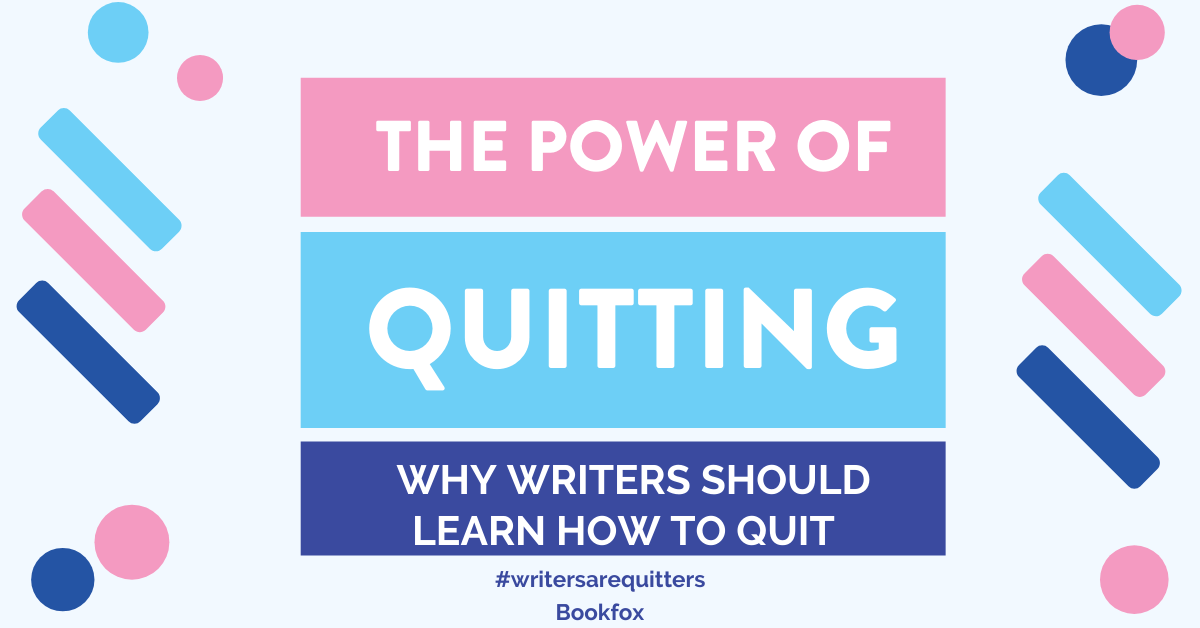 When I was 31 years old, I’d been laboring over a novel for 5 years.
When I was 31 years old, I’d been laboring over a novel for 5 years.
It was a quagmire. I was hopelessly stuck in a plot that wouldn’t move, in characters that couldn’t elicit sympathy, and with ambitions that were far beyond my skill as a writer.
When I’d started the novel, I had a grand vision that hadn’t played out on the page. I’d dreamed up a magnificent castle and built a ramshackle hovel.
Scenes were randomly scattered over 50-odd different files. I had far, far too many characters. I couldn’t find an ending.
But here’s the thing: I wasn’t a quitter.
I thought that only losers quit.
This story shaped my identity: When I was in high school, I tried out for the JV basketball team both as a freshman and sophomore – and didn’t make the team either year. And this was not a super competitive, 2000-member high school. My graduating class was 30 kids. Nearly every male in school played sports. Still, I did not make the cut.
So what did I do, being a determined, never-give-up, dig-your-heels-in type of guy?
 I went out and bought strength shoes. Does anybody remember these from the early 90s? They had these columns from the toe that went down to a rubber, 5-pound weight. Basically, it put all your body weight on your toes, and this was supposed to turn you into superman.
I went out and bought strength shoes. Does anybody remember these from the early 90s? They had these columns from the toe that went down to a rubber, 5-pound weight. Basically, it put all your body weight on your toes, and this was supposed to turn you into superman.
The shoes promised you could dunk after using them for 6 months. I thought if a 6’ dude like myself could dunk, the coach would be awed beyond belief and beg me to start every game.
So I followed the 20-exercise guidelines on the two laminated pages that came with the shoes.
I ran up bleachers. I jumped onto boxes. I ran figure eights. I jumped rope. I did high knees. I sprinted.
 I’m sorry to report that I never did gain a huge vertical and lay down a vicious dunk on my slack-jawed classmates, hanging on the rim for emphasis as I said, “Sure you want to cut me this year, suckers?”
I’m sorry to report that I never did gain a huge vertical and lay down a vicious dunk on my slack-jawed classmates, hanging on the rim for emphasis as I said, “Sure you want to cut me this year, suckers?”
But I did get much, much faster. So with that speed and learning how to draw fouls (I was very good at flailing my limbs and falling down), I became a great driver.
And guess what? I made the JV team my junior year, and started scoring 20 points a game (Take that, Coach Long!) In fact, I was so good they moved me up to varsity in the middle of the year. And my senior year, I started every single game.
So you can see the lesson I learned. If you can become the type of person that doesn’t give up, and you work very hard, you can get what you want.
And that was the lesson I applied to writing. That was why after 5 years I hadn’t quit my first novel. Because I thought if I trained hard enough, if I really put my typing fingers to the grindstone and threw enough hours at it, I would eventually have a breakthrough and score an agent and get a huge advance and become wildly famous and adored by readers everywhere.
This was a dumb approach.
Quitting, as it turns out, is one of the best skills you can have as a writer.

And I’m not talking about Capital Q Quitting, like quitting all efforts to be a writer and becoming a belly dancer or intellectual property rights lawyer.
I’m talking about lower case quitting. Here are the three types of quitting skills you need as a writer:
- Project
- Method or Approach
- Genre
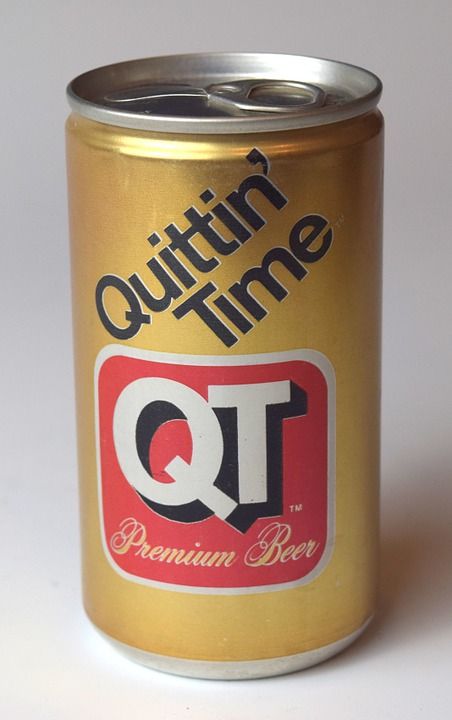 First, let’s talk about quitting projects. It was the best decision I ever made to quit that novel. One day I decided to throw it all away, and the next morning I started a new novel. I finished that new novel in two months. Boom!
First, let’s talk about quitting projects. It was the best decision I ever made to quit that novel. One day I decided to throw it all away, and the next morning I started a new novel. I finished that new novel in two months. Boom!
I had to quit in order to free up my brain to create something else. Sometimes when you’re in the weeds, it’s much easier to start over than to salvage something which is fundamentally broken.
In fact, if you read thousands of interviews with professional writers (I have!), nearly every single one of them has a story of a novel they have thrown away or abandoned. Here’s the most surprising thing: quitting is not the realm of the amateur, but of the professional! Professional writers are professional quitters. All the best writers know when to quit, and quit frequently, because they can understand when a book isn’t working.
Jonathan Franzen worked on a book for years after the Oprah-blessed “Corrections” came out, and he tossed the whole thing in a dumpster.
After the success of “White Oleander” and “Paint it Black,” Janet Fitch worked on a historical novel for several years before calling it quits and writing her 3rd novel.
I’ll say it again: professional writers are professional quitters. Knowing when to quit your book is one of the hardest, yet wisest thing you can do.
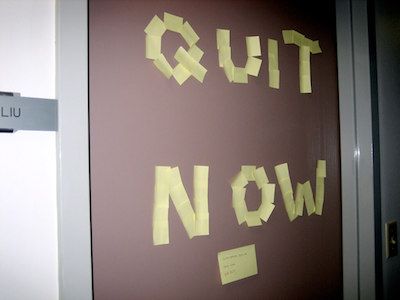 Second type of quitting: quitting your method or approach.
Second type of quitting: quitting your method or approach.
For the longest time, I wanted to nail a spot in one of the top 10 literary magazines. And I got so close. Oh man, the rejection letters I got were so nice I framed them and texted them to my mother.
But over a span of about 8 years, I racked up 1500 rejections from literary magazines. And here’s the thing: when I did score a win, it often came with a gigantic win of a “contributor’s copy.” Woohoo! I spent months of my life and two years of submitting to land a story in a journal that 3 people read, and that I actually lost money publishing.
For me, writing was about the prestige of these literary magazines. That was the route I needed to take to become a writer. That was what my MFA program had funneled me towards. That was what Poets and Writers told me to do. That’s what my fellow writers were doing.
But of course that’s not the only route to becoming a writer. In fact, it’s kind of a dumb route to become a writer (it’s a much better route to becoming an academic).
So I quit cold turkey. I simply decided, after I’d won some contests and published my first book of short stories, that I wasn’t going to write any more short stories or submit to literary magazines again.
I wanted to hunt the big game of novels.
Quitting that methodology of becoming a writer was the best thing I could have done for my writing career. I simply abandoned that strategy and choose a completely different one: writing for an audience, rather than prestige. Writing for a wider group of people than other writers. Writing something other people want to read rather than writing to impress others.
Listen, if how you’re trying to become a writer isn’t working, don’t keep knocking your head against the gatekeepers. QUIT. Simply abandon that route and choose a completely different way to become a writer.
I don’t know what that looks like for you. It might be self publishing rather than traditional publishing (or it might be traditional publishing rather than self publishing!).
It might be stopping the evaluation of your writing career on the basis of money or fame, and starting to evaluate them on the basis of self fulfillment and reaching a small pool of readers in a deep way.
Whatever it is, find it. Go to a conference. Talk to other readers. There are many paths that lead to the writer’s life. Don’t get stuck on just one.
 Okay, let’s talk about the third category: Quitting Genre.
Okay, let’s talk about the third category: Quitting Genre.
Switching genres can be such a career boost for writers. Look at John Banville, how he stopped the arch prose of his highly literary novels and just pounded out some excellent crime novels under the pen name Benjamin Black. He earned 50x the amount of readers because he switched to a new genre.
Or my friend Shann Ray started writing short stories, then went to poetry, then novels, then poetry again. Switching between genres has strengthened his writing muscles, so when he goes back to fiction after writing poetry, his prose is more muscular. And plus, he gains a different audience when writing each genre, and they become aware of his other books.
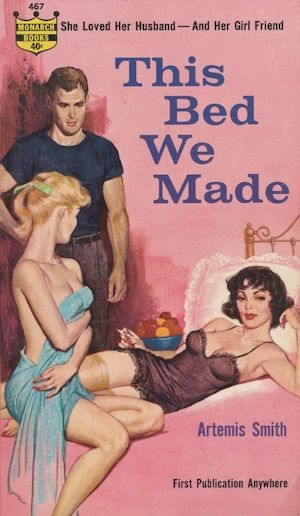
If you haven’t had success with a genre – literary, sci-fi, romance, fantasy – try changing it up. Write something that you’ve never written.
Here’s a confession: I once got so bored with the literary genre I wrote an erotica short story. It ended up being one of the funniest pieces I’ve ever written. Erotica is a great pleasure to write, and I never stopped laughing. Have you ever tried? It will truly teach you how not to write a sex scene.
And I think trying out erotica for a short story loosened up some of my writing muscles. I was able to return to my real project and break through. In that case, I just needed to quit for a second before returning to my goal.
Just remember, quitting doesn’t have to be permanent. Sometimes the quitting is only for a time. For instance, seven years later, I’ve taken the idea of that first novel and tried to write it again (from scratch!).

Why do writers hate quitting?
It’s because we love ourselves too much. It’s because we want to think of ourselves as constantly victorious, able to triumph over the words on the page, and able to use our mighty wills to bend the story to our whims.
But sometimes, you just have to admit your own limitations.
Sometimes, you have to acknowledge that language – the warp and woof of syllables and sentences – is greater than you are, and that you are its servant.
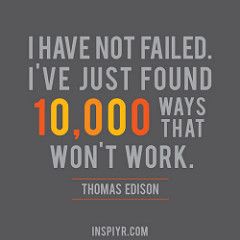 I am here to tell you that it’s okay to quit. You’re not going to stop being a writer if you abandon your current project. You are not going to be a failure if you switch tracks.
I am here to tell you that it’s okay to quit. You’re not going to stop being a writer if you abandon your current project. You are not going to be a failure if you switch tracks.
Listen to me: it’s okay. Don’t feel guilty. Don’t feel like you’re a failure. Think of it using one of the euphemisms the military would use about retreating: it’s a “tactical repositioning.”
You’re not running away from writing, you’re just choosing to run in a different direction.
Ultimately, the writer who is too proud to quit is going to get stuck. If you’re stuck, please try the one thing you thought you couldn’t do: quit.
Do you have a story of how quitting made you a better writer?
Or have you quit a project, method, or genre? I’d love to hear about it in the comments.
Be a smart quitter. Quitters are the winners (I want a T-shirt with that line).
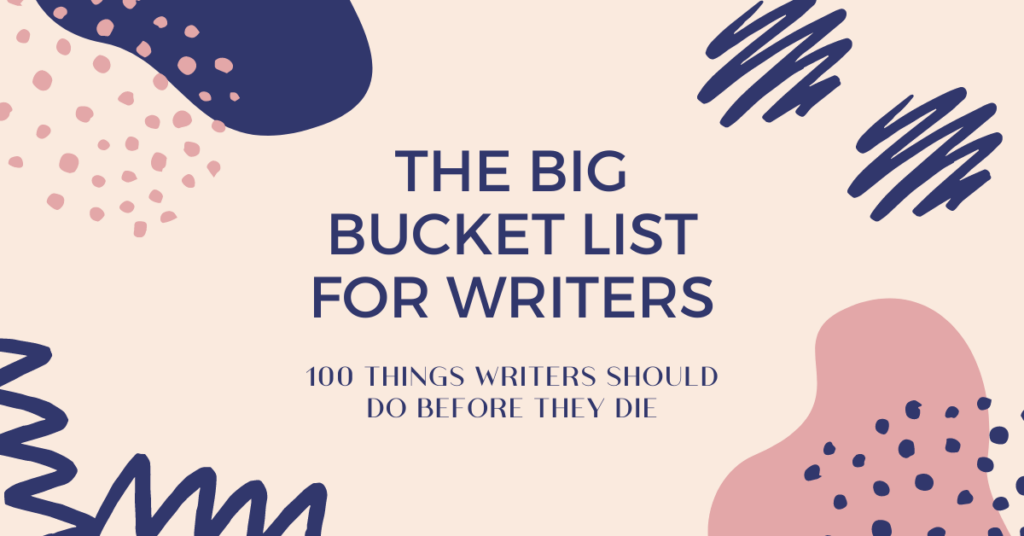

30 comments
I too worked on a novel for years. I quit and entered an MFA program. I’m ashamed to say I have a lot of quit in me. I’m not proud of it, but it’s true. I have a BFA in painting. I painted for years. I quit and started writing the novel that I quit. I’ve quit piano, violin, and guitar, oh, and basketball. I’ve quit sculpture, weaving, and drawing. Now my goal is to finish a collection of short stories. I aim for 100 rejections a year. I get one story published for about every 100 I submit. I receive some beautifully encouraging and kind rejections. So, that’s where I’m now. I think about going back to the novel I quit. It was a YA novel and it’s still a part of me, although it’s somewhere on floppy discs, somewhere in a few notebooks. I’ve moved so many times, it may not be anywhere.
Nothing wrong with having a lot of quit in you. Unless you absolutely can’t finish anything.
If that YA novel is still in you, I’d encourage you to finish it.
WoW! Your message above is about what I did! Quit! I did not quit with the idea to throw my book away. I just quit to figure out what I wanted to do with it. It was finished, I thought? I loved my story line and was not going to give it up. I felt I had more to do, but what more do you do with a finished book.
My cousin Larry Chambers, a writer, suggested I write short stories. His suggestion never left me. It was like a tap on the shoulder every now and then.
Your article above turned the light bulb on. I had a lengthy story book, but kept thinking about a series of short stories. I was excited about each new story that was connected to my original book. My conclusion is to write a “Series” in one book of short stories each with a connection to my orginal book (same location, characters). Can’t wait to start.
Donna Eye
Thanks for this article, I really needed it. I’m on the verge of quitting a novel that I’ve rewritten over and over again. It just sort of wanders off towards the end and I can’t reach a satisfactory conclusion. I have better projects to work on. I’m letting go of this one and moving on. You’ll see my published novels sooner or later.
I think it has nothing to do with the quitting in me. I think it is more on the lazy side or procrastinating. I believe that the stories I write are good stories, I just let unimportant things get in the way.
Hi Brenda,
I know that John is the expert here, but reading your posting it came to me that a lot of novels and movies,(some based on novels) never reach a conclusion. You may have seen some movies that look ‘unfinished’ the way I see it. We go: Oh? Is that it? and we think: It should end this way or the other way…
So this idea came to me: why don’t you write under the title of the book: Volume or book 1?. So when you regain the inspiration, you go back and write another volume and finish the Novel in Volume 2. In the meantime try to publish the “Vol. I (To be continued)
Good luck.
MF
I worked long and hard on a fanfiction story that was going nowhere. Constant pressuring from both my readers and friends and family made me extend the project longer then it should have, so long, in fact, that after a couple of chapters, the story no longer made any sense. I finally quit it and decided to start a new page, fresh, and it worked wonders for me!
I definitely recommend quitting while you can, before it stretches out any further. Great post, by the way.
Thanks for that piece. I think we’re on the same page here (excuse the pun)…I’m on the verge of abandoning a novella I’ve almost completed. My idea was to write a literary work. I have always been inspired by a classical style of writing and I was also inspired by the early James Joyce (before consciousness streaming) and Graham Greene when I decided to write this novella. I will finish the book and shelve it, but I must add, it was a wonderful exercise in honing my writing skills. My vocabulary has increased ten fold as it was a slow written piece, taken out and polished daily. I have learned so much by this…and also recently an observation by a professional (I think it was on this web page) who said that, (not verbatim), ‘classic style writing is no longer interesting to publishers in modern literature’. It was as if my conscience was speaking to me. So, it’s time for a paradigm shift…Thank you for sending that thought my way.
Love Graham Greene and early Joyce, but I think you’re write that the consciously literary style has fallen out of favor. Everyone now is simply looking for voice, and by voice they almost always mean something more colloquial.
Thanks for the push I needed…to actually finish the one I’m editing now.
Ha ha! I don’t want everyone to quit what they’re working on right now … glad it inspired you to finish!
I’ve been working on a book for months, and (unsurprisingly) I sort of just… stopped. It’s really weird, because this story has a wonderful plot, well-developed characters and the first chapter worked out as planned. As I started on with the second chapter, things just started to fall apart – like when you bake cookies and they’re perfect around the edges, but start collapsing when you reach the center. My solution? Quitting that for a while, and just working on some silly short stories (one whose inspiration came from a chat when I was playing video games) to let my mind reset, so that my novel has the best work possible.
This is why I don’t believe in Writer’s Block. We’re not machines made to steamroll through a book. Pausing is not the same as a block. Clearly your brain needs some space to process and consider the next step. As long as you’re creating the space in your life that will feed your creativity, it sounds like you’re doing everything right.
SALVATION ON DEATH ROW The Pamela Perillo Story, KiCam Projects, 2017
Taken from the book’s Preface
In the mid-1990s, a bid request appeared in our local paper for an independent firm to read the water meters once a month in an adjoining town. This job sounded like a perfect opportunity for “Jerry” and me to work together. Jerry lived nearby in the same neighborhood I did. He was smart, good with his hands, and unemployed except for odd jobs. And a big plus: I knew he would be trustworthy and reliable, not only from my own intuition, but because he was well known and an avowed Christian who openly helped the homeless. He could read the meters, and I could supply a corporation, truck, insurance, bond, initial financing, and paperwork. A perfect match. After obtaining the necessary forms, I planned to approach Jerry with this idea, get his approval, and obtain a performance bond.
On a beautiful spring afternoon, I was fishing from the shore of a lake close to both our homes. A tree-lined banks about three feet high rose behind the shore where Jerry surprisingly appeared as if I had called him.
“Doinganygood?” he clipped.
“No, not really,” I replied. After a few minutes of chitchat, I made the proposal: your hands, my brains. His response sounded like an electric typewriter, one word per stroke, far too fast for my aged mind to digest and not particularly on the subject. I tried to check the size of his pupils, but the sun was behind him, and I was unable to confirm my suspicion – he might be on drugs.
Something didn’t click at that point next to the lake between Jerry and me, so I let my offer die on the table. Jerry moved away shortly after that.
In 2010, about fifteen years later, I heard from Jerry’s ex-wife that he had been tried for capital murder following a drug-induced rage that ultimately ended in several homicides. The state where the crime occurred, similar to Texas, used a bifurcated trial: one for conviction, the other for punishment. The jury returned a verdict of death by lethal injection. As of this date, almost twenty years later, Jerry still waits on Death Row in painful apprehension as his appeals twist through the court system and the state scampers to find the necessary drugs for his death.
Jerry’s experience changed my thoughts and touched my life. I wrote to Jerry, and we readily agreed to collaborate on his story in the hopes that it might help others. We had barely started before Jerry realized that because the penal system in his state (and all others) scrutinized every page of correspondence, the details of his life and the homicides could endanger his appeals. We placed the project on hold.
Still, the execution of someone who had been possessed by narcotics while committing a criminal act haunted me. As a fiction writer, the thought occurred: The novel’s the thing to place before the conscious of the people (Hamlet paraphrased). Yes, a thought provoking Great American Novel about the injustice of the death penalty, especially in my native state, Texas. I decided that my central character would be female.
Midway through the novel, it was evident that I needed a description of the female Death Row Unit in Mountain View. On the Internet, I found an old prison pen-pal request from Pamela Perillo. After several letters and telephone conversations, Pam and I realized that we had the same purpose for sharing her story as that which Jerry and I had intended: a plan for a book born of a hope that it might help others.
I quit working on the fiction book. I am glad that I did.
John T. Thorngren
WOW, fantastic story! Sounds like an incredible book project. Good luck with it!
Boy, did I need your discussion on quitting. I feel so relieved that I can quit without guilt. This is a big step for me. I really thought poetry was my real direction, after years of being a non-fiction writer. Now, maybe I won’t go back to writing at all. Now I know that it’s okay.
Thanks!
Write what you enjoy. Find a project you take pleasure in. Whether it’s poetry or nonfiction. Or even fiction! Or screenplays! Playing with genre is really freeing.
It’s all about the joy of story and language. If you’re not enjoying it, find a different project to work on.
I am sitting here at 11:07 PM on a warm and humid, western NY night. I just finished your article and am tearing up. I haven’t written a thing in about two months, and have been feeling guilty for walking away from it; so guilty that I have been toying with quitting writing altogether. The lies in my head were goading me to believe I am not a writer after all. I was on the edge of a dismal abyss of dicouragement, ready to cannon- ball into stagnant pool of defeat and woeful acceptance or belly-flop into agony sinking in the regrets of never writing again. And so, there I was – I open my email, and there you are, oh wise fox! In the nick of time you have whisked my motivation to an enchanted land of refreshing truth! To learn the normalcy of what I am experiencing has freed my resolve…given me the hope to press in and “quit” the old for something new. Your inspiration has resurrected the writer in me
Thank you!
Lorna, I’m so happy to hear you say that. Being a writer can be a tough road, and it’s really easy to get depressed about all the setbacks. I am glad that in a small way I can help you along the journey.
Also, please call me wise fox in every comment thread from now on. 🙂
Interesting article. Huge difference between quitting and throwing in the towels. Quitting allows a “paused time” or a gap time, when throwing in the towels doesn’t. So quitting helps to regain refreshing times….to gain perspective…and then boom! So quitting has no or little effect of guiltiness, so it has to do more with more refreshing gains down the line. I’ve personally quit, minded my business for a short time, and reverted back – I was flabbergasted at the way my writing was seen. I realised that there is power in quitting in the context of achieving the targeted goal. That is…!
“There is power in quitting in the context of achieving the targeted goal” — great line.
Another reason writers resist quitting is that it feels as if we’re committing murder, even mass murder, of characters who have become real people to us and in whom we’ve invested emotional energy. Perhaps we should instead think of it as sending them off on a long vacation from which they might never return or may come back transformed and given a new life by us.
Wow Ann, I’ve never thought of it that way. That’s a great insight. A kind of loyalty to our creations.
An extreme twist on the adage to “kill your darlings.”
love you and your radiant ideas, my friend.
can’t wait to hold your next book in my hands!
-Shann
Thanks, Shann!
Brilliant John. I always love your writing, but this is profoundly helpful. God bless you and your family.
Thanks, Joel! Blessings to you as well.
I considered scrapping a project that I started 7 years ago that I’m in the process of editing. I had to take a step back from it to see that my approach wasn’t practical for the story I’m trying to tell. I had to quit trying to make stories be what I want them to be – if that makes sense. I guess what I’m saying is that I was trying to tell the story in an ideal way. Once I abandoned an idealistic approach to storytelling, I found that the ideas flowed a lot better and now I am able to bring out many elements that I would have otherwise overlooked.
Hi Joslyn,
I love that insight. You can’t force a story into a certain mold you want for it, you have to listen to it and tell it the way it wants to be told. Good luck with the re-writing of it!